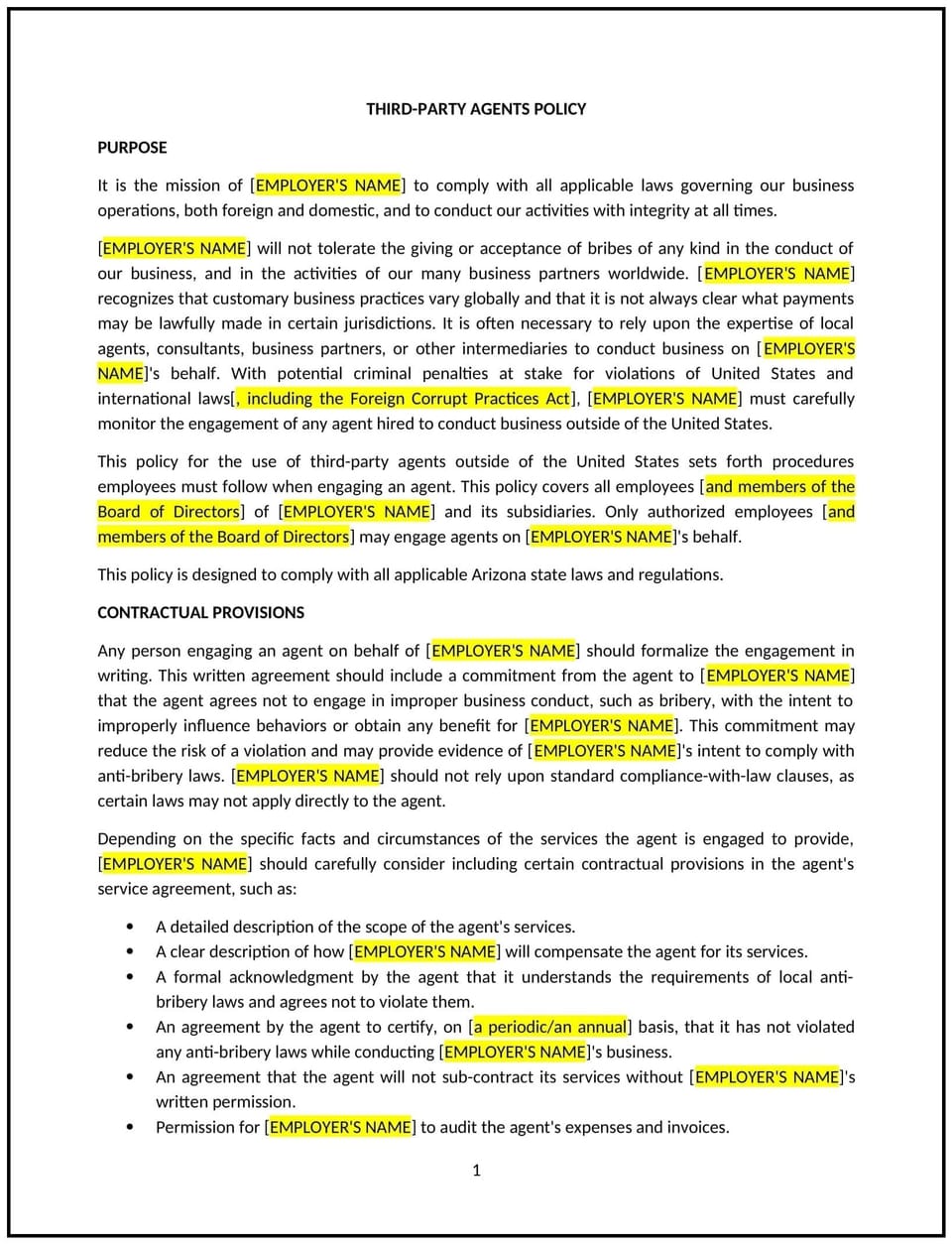Third-party agents policy (Arizona): Free template

Third-party agents policy (Arizona)
In Arizona, a third-party agents policy provides businesses with guidelines for engaging third-party agents, contractors, and vendors to ensure that their actions align with company standards and legal obligations. This policy helps protect the company from potential risks associated with third-party activities, such as breaches of confidentiality, non-compliance with regulations, or unethical behavior.
This policy outlines the requirements for selecting, monitoring, and managing third-party agents, as well as the necessary contractual provisions to ensure that these agents act in the best interests of the company. By implementing this policy, Arizona businesses can mitigate risks, ensure compliance, and maintain strong, ethical relationships with third parties.
How to use this third-party agents policy (Arizona)
- Define third-party agents: Specify the types of third-party agents covered by this policy, including contractors, consultants, vendors, and service providers.
- Establish selection criteria: Outline the process for selecting third-party agents, including background checks, compliance with industry standards, and alignment with company values.
- Include contractual provisions: Ensure contracts with third-party agents include clear terms regarding confidentiality, compliance with laws, deliverables, and dispute resolution procedures.
- Monitor third-party performance: Set expectations for how third-party agents will be monitored for compliance with contractual terms, ethical standards, and legal requirements.
- Address termination procedures: Provide guidelines for terminating contracts or relationships with third-party agents who fail to meet performance expectations or breach the terms of their agreement.
Benefits of using a third-party agents policy (Arizona)
This policy offers several advantages for Arizona businesses:
- Reduces legal risks: Ensures third-party agents comply with legal requirements, reducing the risk of liability or reputational damage.
- Enhances compliance: Guarantees third-party agents follow industry regulations, company policies, and ethical standards.
- Protects sensitive information: Establishes clear confidentiality requirements, safeguarding company data and intellectual property.
- Improves operational efficiency: Provides a structured framework for selecting, managing, and evaluating third-party agents, helping streamline operations.
- Strengthens relationships: Sets clear expectations, fostering transparent and trustworthy partnerships with third-party agents.
Tips for using this third-party agents policy (Arizona)
- Address Arizona-specific considerations: Reflect Arizona-specific regulations or industry standards that apply to third-party relationships, especially in regulated sectors like healthcare or finance.
- Perform due diligence: Conduct thorough background checks and evaluations on potential third-party agents to ensure they meet legal and company standards.
- Use technology: Leverage contract management software to track agreements, monitor performance, and ensure compliance.
- Include audit clauses: Ensure contracts with third-party agents include provisions for periodic audits to verify compliance and performance.
- Review regularly: Update the policy as needed to reflect changes in laws, industry standards, or company requirements.
Q: What types of third-party agents are covered under this policy?
A: This policy applies to contractors, consultants, vendors, service providers, and other external parties with whom the company has a contractual relationship.
Q: How are third-party agents selected?
A: Third-party agents are selected based on criteria such as reputation, compliance with industry standards, background checks, and alignment with the company’s values and needs.
Q: What should be included in contracts with third-party agents?
A: Contracts should include terms related to confidentiality, performance expectations, legal compliance, dispute resolution, and termination clauses to protect both parties.
Q: How are third-party agents monitored for compliance?
A: Third-party agents are monitored through regular performance evaluations, audits, and reporting to ensure adherence to the terms of their agreements and company policies.
Q: What happens if a third-party agent fails to meet expectations?
A: If a third-party agent fails to meet contractual or performance expectations, the company may terminate the contract or take legal action as defined in the agreement.
This article contains general legal information and does not contain legal advice. Cobrief is not a law firm or a substitute for an attorney or law firm. The law is complex and changes often. For legal advice, please ask a lawyer.


